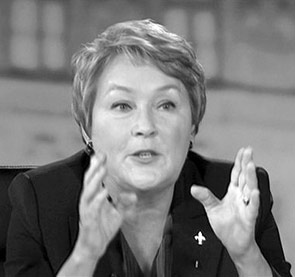Power play: Pauline Marois
 CREDIT: RADIO-CANADA.CA
CREDIT: RADIO-CANADA.CAQuebec Premier Pauline Marois.
The recently elected Quebec premier, Pauline Marois, is facing a decision that could make her the shortest-serving Canadian provincial premiere in over three decades: whether or not to introduce a fall budget. She's leading a minority government and the inherent challenges that come with this include passing legislation, budgets, and having a majority in committee hearings. It puts her in a position similar to the one recently vacated by former Ontario Premier Dalton McGuinty.
Marois holds 54 seats in the National Assembly, their version of the Ontario Legislature, a mere four more than the opposition. The Liberal Party boasts 50 members and the CAQ represents the majority of the remainder with 19. This puts the premier in a precarious position, one that a successful budget could solidify.
Cristine de Clercy, associate professor of Political Science at Western University, weighed in on the situation. "One reason why she might want to introduce a budget is that her party made some fairly large financial commitments during the election campaign that she then recanted on. In Quebec, the business community in particular seems to be a little bit nervous, so presenting a budget outlining what are her government's taxing and spending plans could actually be quite helpful in terms of allaying the general uncertainty around the budget that exists."
The ferocity of Marois' campaign may have given her the edge to gain a minority government, but that same edge could be worrisome, particularly to those in the business sector. Upheaval is extremely bad for business and despite being elected on a vigorous mandate, the populace might prefer a period of leadership stability.
The uncertainty will provide Marois with some leeway in passing a fall budget, but the all-important question de Clercy addressed was: how much? "I think the risk, though, is that if she introduces something that is highly controversial in her budget, that is enough to provoke certain interests in Quebec, and enough to spur the opposition parties to bring down her budget and willingly go into an election, then obviously she may well pay for that mistake; it could be a giant mistake." It's of critical importance that Marois identifies what these interests are or risk introducing offensive policies unbeknownst.
De Clercy made an interesting point, namely that Marois may well introduce a fall budget as a "placeholder" until the spring when the federal budget is unveiled. This strategy gives her more time to craft legislation and financial policy.
The politics of Quebec often seem inaccessible or even irrelevant because of the geographical and linguistic barriers that separate them from Southern Ontario. It's crucial to recognize that Quebec is an integral part of Canada, even from a population standpoint, as they contain nearly a quarter of Canada's population. A traditionalist Premier like Marois will drive the province towards solidarity, preferential treatment of French-Canadians, and potentially even a referendum. The final budget that is approved, or potentially not, will be hugely indicative of Marois' future plans for the province and, by extension, all Canadians.
Editorial opinions or comments expressed in this online edition of Interrobang newspaper reflect the views of the writer and are not those of the Interrobang or the Fanshawe Student Union. The Interrobang is published weekly by the Fanshawe Student Union at 1001 Fanshawe College Blvd., P.O. Box 7005, London, Ontario, N5Y 5R6 and distributed through the Fanshawe College community. Letters to the editor are welcome. All letters are subject to editing and should be emailed. All letters must be accompanied by contact information. Letters can also be submitted online by clicking here.













